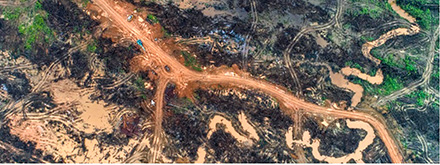A major sawmill operation linked to widespread deforestation and corruption in Indonesia has had its legality certification revoked by the licensing authority over allegations of a forged permit, meaning it will not be allowed to export any wood products. Source: Mongabay
Operator PT Tulen Jayamas Timber Industries (TJTI) had established the sawmill in Boven Digoel district, in Indonesia’s easternmost province of Papua, to process an estimated $6 billion worth of logs anticipated to be cut to make way for the Tanah Merah mega plantation project there. The plantation, earmarked mostly for oil palms, could lead to the clearing of up to 280,000 hectares (692,000 acres) of rainforest — an area nearly twice the size of New York City.
But the multibillion-dollar project has been mired in a litany of controversies, with a 2018 investigation by Mongabay and The Gecko Project showing how permits were issued by an official in jail on corruption charges; Indigenous peoples were coerced into relinquishing the rights to their ancestral lands; and the true identities of the individuals behind the project were concealed behind fake nominees and shell companies in tax havens.
In 2019, allegations emerged that fake licenses had been issued to some of the operators involved in the project. Specifically, the Boven Digoel district investment agency alleged that the environmental license for TJTI’s sawmill was fake. Officials sent a letter to TJTI demanding that it stop operating.
Officials from the Papua provincial investment agency also got involved, alleging that permits for the seven concessions in the Tanah Merah project were falsified at a critical stage of the licensing process. While the permits bore the signature of the former head of the agency, he has reported in writing that it was forged. The allegations were uncovered in a follow-up investigation by Mongabay and The Gecko Project.
Following the allegations, Earthsight, a UK-based non-profit investigative organization, found that the sawmill had been certified under the Indonesian government’s timber legality scheme, or SVLK.
The system, accepted by some of the most stringent market regulators for timber legality, including the EU, is meant to ensure that all parties in the timber supply chain obtain their wood and timber products from sustainably managed forests and conduct their trading operations in accordance with existing laws and regulations.
But with the permits underpinning the plantations and the sawmill suspected to be forged, Earthsight sent an inquiry to PT Borneo Wanajaya Indonesia (BWI), the third-party assessor that certified the sawmill as SVLK-compliant in 2019.
After being notified of the allegations and the stop work order, BWI conducted an audit in March 2020. The results confirmed that TJTI’s environmental permit was faked, thus invalidating its compliance with the timber legality standard. The audit resulted in a suspension of the sawmill’s SVLK certificate for three months to give TJTI the opportunity to prove that the allegation of a forged environmental permit was not true.
TJTI failed to meet the deadline, however, and its SVLK certificate was permanently revoked as of July 17.
“Since that date, the [SVLK] certificate of TJTI has been revoked by us and they’re no longer our client,” BWI told Mongabay. “This is because there were complaints from stakeholders and the complaints have had been proven.”
The revocation of the sawmill’s SVLK certificate means that TJTI cannot legally export timber products, as compliance with the SVLK scheme is mandatory for all timber exports from Indonesia. However, it can still sell timber domestically, even though the sawmill has not begun to operate yet.
Djukmarian, the Boven Digoel district investment agency head, said his office has not yet decided what to do with TJTI’s case, pending instructions from the district government.
“TJTI has ceased to operate since last year until now,” he told Mongabay. “We are focusing on making sure that the company is not operating.”
It’s also not clear whether the government will follow up on the allegations of the forged plantation permits for the seven concessions. Instead, the government has agreed with the companies that have already started operating and cleared forests that they may redo the entire permit process from the beginning to be allowed to keep operating.
BWI said it didn’t look into the allegations of the forged plantation permits because those fell outside the scope of its audit, which was focused solely on the sawmill and its legality.
Djukmarian said his office was powerless to pursue those allegations retroactively.
“I’m sorry but I can’t take further action,” he said. “One of the reasons is because when the permits [alleged to be falsified] were issued, the investment office [in Boven Digoel] wasn’t established yet.”






